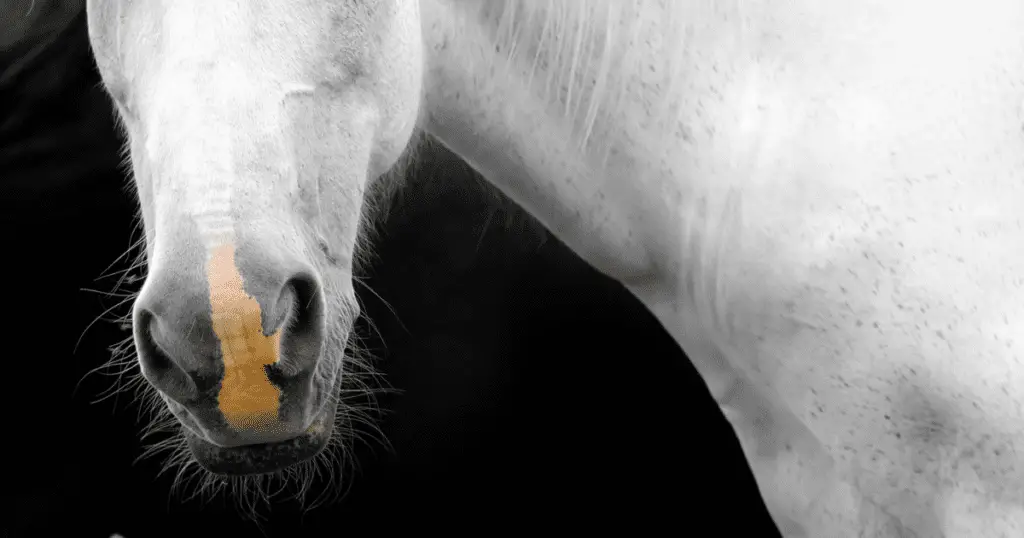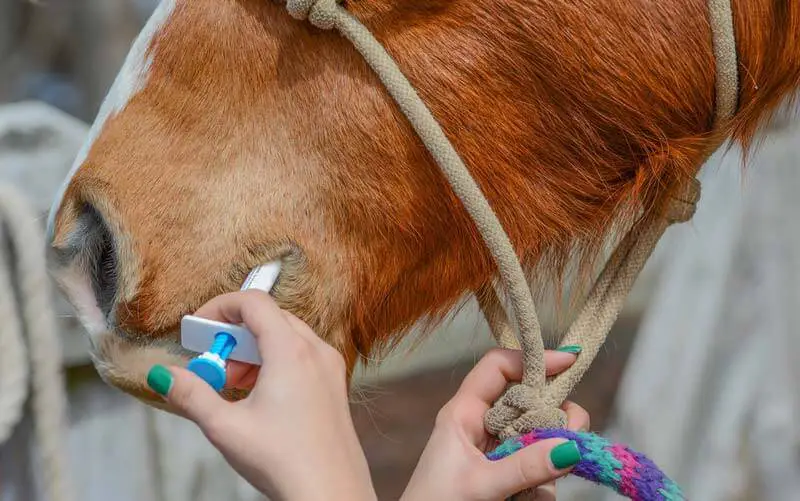Green Nasal Discharge in Horses can be caused by a variety of factors, including infections, allergies, and respiratory problems.

Table of Contents
It’s important to take action quickly if your horse is experiencing this symptom, as it could indicate a serious health issue. The first step is to determine if the nasal discharge has had a sudden onset or has been developing for some time, and how distressed your horse is. If you have just fed your horse and they suddenly develop green discharge from their nose and start coughing etc – they have what we call “choke” and feed material has lodged in their oesophagus or entry to the esophagus. If this has occurred it is important to consult with a veterinarian to determine the underlying cause of the discharge. Depending on the diagnosis, treatment options may include antibiotics, antihistamines, or other medications, as well as changes to the horse’s environment or diet.
Causes of Green Nasal Discharge in Horses
When a horse has green discharge coming from its nose, it is usually a sign of an underlying health problem. The causes of green nasal discharge in horses can be broadly classified into two categories: infectious and non-infectious causes.
Infectious Causes
One of the most common causes of green discharge from a horse’s nose is a bacterial infection. Bacterial infections can be caused by a variety of bacteria, including Streptococcus equi, which causes strangles, and Rhodococcus equi, which causes pneumonia. Other infectious causes of green nasal discharge in horses include viral infections, such as equine influenza and equine herpesvirus, and fungal infections, such as Aspergillus.
Non-Infectious Causes
Non-infectious causes of green nasal discharge in horses include allergies, irritants, and foreign bodies. Horses can be allergic to a variety of things, including pollen, dust, and mold. Irritants, such as ammonia from urine-soaked bedding, can also cause nasal discharge. Foreign bodies, such as grass and food can get stuck in a horse’s nasal passages and cause irritation and discharge- this is commonly called “choke”. This can be a medical emergency and your horse can panic and show colic-like symptoms and have trouble breathing. The blockage needs to be removed quickly to prevent an aspiration pneumonia from developing. Aspiration pneumonia occurs when food material enters the lungs and causes an infection.
In some cases, green nasal discharge can be a symptom of a more serious condition, such as guttural pouch infection or cancer. It is important to consult a veterinarian if your horse is experiencing green nasal discharge, especially if it is accompanied by other symptoms such as fever, coughing, or difficulty breathing.
Symptoms
The green discharge may be accompanied by other symptoms such as coughing, fever, and loss of appetite. The discharge may also have a foul odor, indicating the presence of an infection. It is important to note that not all horses with green discharge will display all of these symptoms.
If you notice any of these symptoms in your horse, it is important to contact your veterinarian immediately. The earlier the diagnosis, the better the chances of a successful treatment.
Diagnosis
It is important to get an accurate diagnosis from a veterinarian as soon as possible. During the diagnosis process, the vet will likely perform a physical examination of the horse, including taking its temperature and listening to its lungs.
In addition to the physical exam, the vet may also perform other tests, such as a blood test, a nasal swab, or a culture of the discharge. These tests can help determine the underlying cause of the green discharge and guide the appropriate treatment plan. They may also pass a tube down the horses oesophagus to check for any blockages.
It is important to note that a green discharge from a horse’s nose can be caused by a variety of factors, including infections, allergies, and even tumors. Therefore, a proper diagnosis is crucial in determining the best course of action for the horse’s health.
Treatment
Once a diagnosis has been made, treatment can begin. The treatment plan will depend on the underlying cause of the green discharge. Here are some common treatments:
Antibiotics
If the green discharge is caused by a bacterial infection, or an aspiration pneumonia is identified, antibiotics may be prescribed. The type of antibiotic will depend on the specific bacteria causing the infection. It is important to follow the veterinarian’s instructions carefully, including completing the full course of antibiotics even if the horse appears to be feeling better.
Supportive Care
In addition to antibiotics, supportive care may be necessary. This can include:
- Keeping the horse in a clean, dry environment to prevent further infection
- Providing plenty of fresh water to keep the horse hydrated
- Feeding the horse a nutritious diet to support its immune system
- Administering anti-inflammatory medication to reduce swelling and discomfort
It is important to monitor the horse closely and report any changes in behavior or symptoms to the veterinarian.
Prevention
As a horse owner, I understand how important it is to keep my horse healthy and prevent any potential illnesses. Here are some tips to help prevent green discharge from your horse’s nose:
- Ensure that your horse has access to clean, fresh water at all times. Dehydration can weaken the immune system and make your horse more susceptible to infections.
- Keep your horse’s living area clean and well-ventilated. A clean environment can help prevent the growth of harmful bacteria and viruses.
- Practice good biosecurity measures. Limit the number of people and animals that come into contact with your horse, and always wash your hands and change your clothes before and after handling your horse.
- Make sure your horse’s vaccinations are up-to-date. Vaccinations can protect your horse from a variety of illnesses, including respiratory infections.
- Manage horses at feed time as they can sometimes feel competition to eat and will gorge themselves causing them to choke.
- Monitor your horse’s health closely. If you notice any changes in your horse’s behavior, appetite, or overall health, contact your veterinarian right away.
By following these simple steps, you can help keep your horse healthy and prevent green discharge from its nose.
Read More: Horse Health



